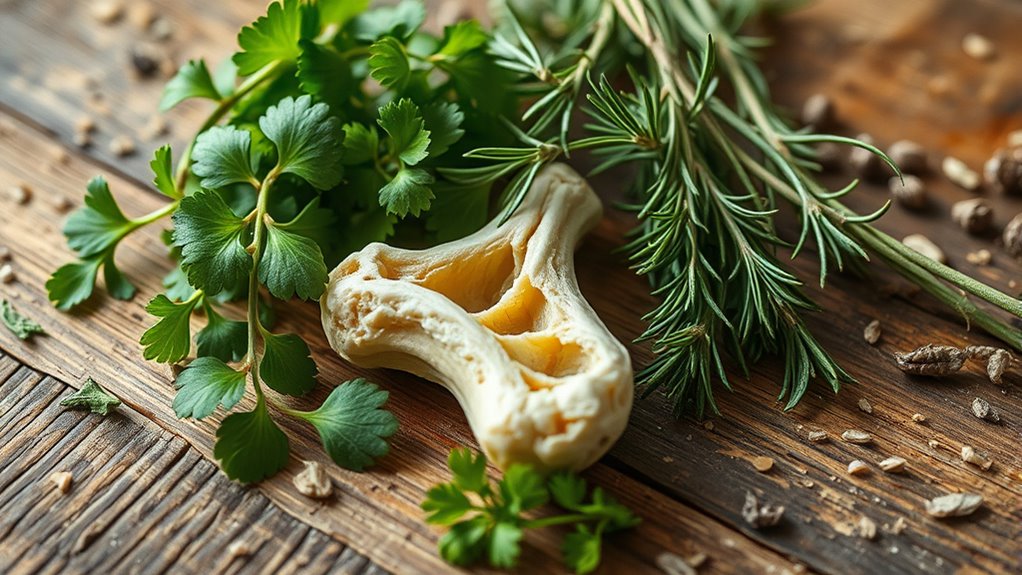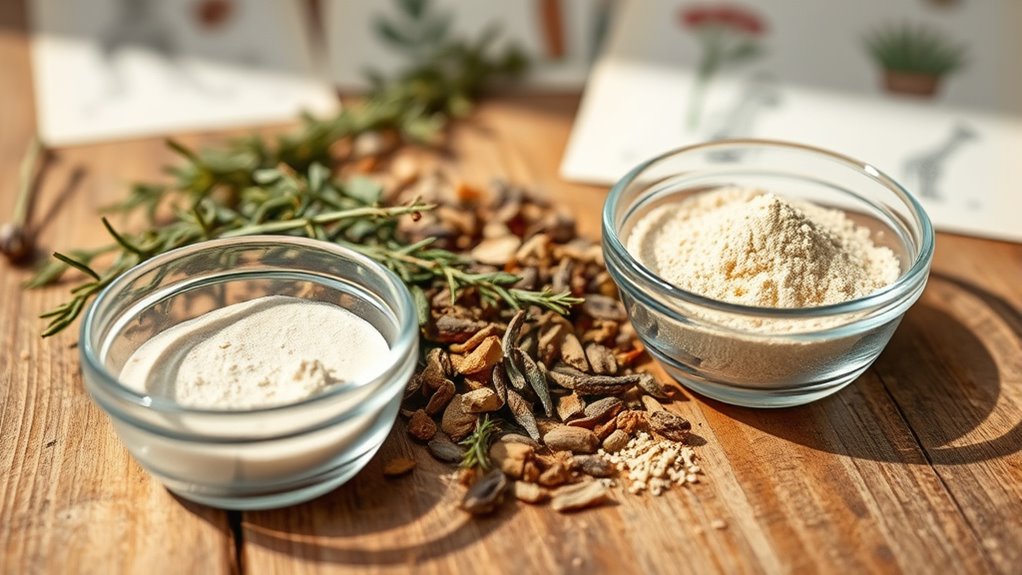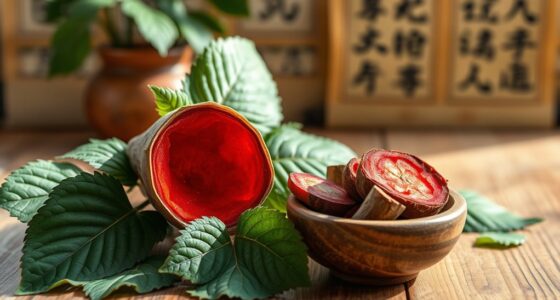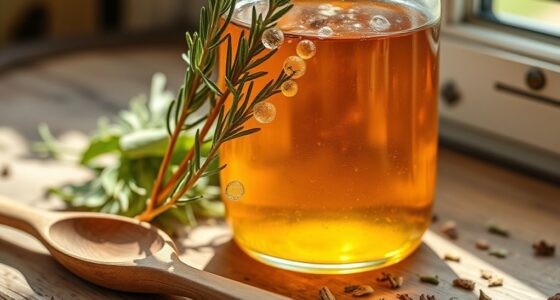To support your bones after menopause, incorporate herbs like black cohosh, red clover, and dong quai, which mimic or promote estrogen’s effects. These herbs help stabilize hormone levels, improve calcium absorption, and prevent bone loss. Combining them with a calcium-rich diet and weight-bearing exercises enhances your bone strength naturally. Continuing this journey will reveal more ways to naturally bolster your bone health and maintain mobility.
Key Takeaways
- Phytoestrogen-rich herbs like black cohosh and red clover mimic estrogen, helping maintain bone density post-menopause.
- Dong quai supports hormonal balance and promotes healthy bone metabolism during hormonal decline.
- Incorporating herbs can enhance calcium absorption and reduce bone loss in post-menopausal women.
- Herbs complement nutrition, exercise, and medical treatment to strengthen bones and prevent osteoporosis.
- Maintaining hormonal harmony with herbal support aids in preserving bone strength and overall skeletal health.

Bones and hormones are closely connected, with hormones playing a crucial role in regulating bone growth, maintenance, and repair. As you age, especially during post-menopause, your hormone levels fluctuate, impacting your bones’ strength and density. One vital aspect of this process is calcium absorption, which hormones help control. When hormone balance shifts, your body may struggle to absorb enough calcium from your diet, leading to weakened bones. Estrogen, in particular, is essential for maintaining calcium levels because it helps regulate how your bones grow and how effectively calcium is absorbed into your bloodstream. When estrogen drops after menopause, calcium absorption diminishes, increasing your risk of osteoporosis and fractures.
Hormone fluctuations after menopause can weaken bones by reducing calcium absorption and increasing osteoporosis risk.
To support healthy bones, you need to focus on maintaining hormone balance, ensuring your body can properly manage calcium. Herbs can be a natural way to help regulate hormone levels and enhance calcium absorption. For example, herbs like black cohosh and red clover contain phytoestrogens—plant-based compounds that mimic estrogen’s effects. These can help compensate for declining estrogen levels, promoting better calcium utilization and supporting bone health. Incorporating such herbs into your routine may help stabilize hormone fluctuations, reduce bone loss, and improve overall bone strength.
Another herb worth considering is dong quai, often used in traditional medicine to support hormonal harmony. It may help balance estrogen and other hormones involved in bone metabolism, encouraging better calcium absorption. Additionally, herbs like sage and thyme contain compounds that support endocrine health, which can indirectly influence hormone production and stability. When your hormone levels are more balanced, your body is better equipped to absorb calcium efficiently, keeping your bones stronger and more resilient. Moreover, understanding the role of Wickless Candle Making and other craft techniques can promote relaxation and reduce stress, which indirectly benefits hormonal health.
It’s important to remember that herbs aren’t a substitute for a balanced diet rich in calcium and vitamin D, nor should they replace medical advice. Instead, they can serve as complementary approaches to support your hormonal health and bone density. Combining these natural remedies with proper nutrition, weight-bearing exercises, and regular check-ups can help you maintain strong, healthy bones well into your later years. Paying attention to hormone balance and ensuring optimal calcium absorption are key steps in preventing bone loss and sustaining your mobility. By integrating herbs that support these processes, you’re taking proactive measures to bolster your post-menopausal bone health naturally.
Frequently Asked Questions
Can Herbs Completely Reverse Osteoporosis?
You might wonder if herbs can fully reverse osteoporosis, but herbal efficacy varies. While some herbs promote bone regeneration and support bone health, they usually can’t completely cure osteoporosis. Instead, they serve as complementary strategies alongside medical treatments. Focusing on a balanced diet, exercise, and proper medication remains essential. Herbs can help strengthen bones but aren’t a substitute for all-encompassing care, so consult your healthcare provider for personalized advice.
Are Herbal Supplements Safe With Hormone Replacement Therapy?
Thinking about herbal supplements with hormone replacement therapy is like walking a tightrope—you need balance. Herbal safety varies, and some herbs can interact with hormones, causing unwanted side effects. You should always consult your healthcare provider before combining herbs with HRT. They can help you understand potential hormone interactions and guarantee your supplements are safe, so you get the benefits without risking your health.
How Long Does It Take to See Benefits From Herbs?
When asking how long it takes to see benefits from herbs, keep in mind that timing expectations vary for each person. You might notice changes within a few weeks, but for others, it could take several months. Your individual response depends on factors like your body, health, and consistency in taking the herbs. Stay patient and consistent, and monitor your progress to understand how your body reacts over time.
Do All Herbs Work Equally for Everyone?
Not everyone responds the same way to herbs, so herb efficacy varies based on individual response. Some herbs work well for certain people, but others may see little benefit. Factors like genetics, health conditions, and lifestyle influence how effective an herb is for you. It’s important to try different options and consult with a healthcare professional to find the most suitable herb for your needs.
Are There Any Side Effects From Long-Term Herbal Use?
Imagine taking herbal supplements daily for years, hoping for benefits. Long-term herbal use can pose risks, such as herbal interactions with medications or unforeseen side effects. While many herbs are safe when used appropriately, their long-term safety isn’t guaranteed. You should consult a healthcare professional to evaluate potential risks and monitor your health, ensuring you enjoy benefits without risking adverse effects from prolonged use.
Conclusion
As you explore herbal options, remember that supporting your bones is like tending a delicate greenhouse—each herb acts as a gentle gardener, nurturing strength beneath the surface. Don’t forget, just as an old-time clock keeps perfect time, consistent care and natural remedies can help maintain your bone health long-term. Embrace these herbal allies and keep your foundation strong, ensuring your bones stand tall through every twist and turn of life’s journey.










